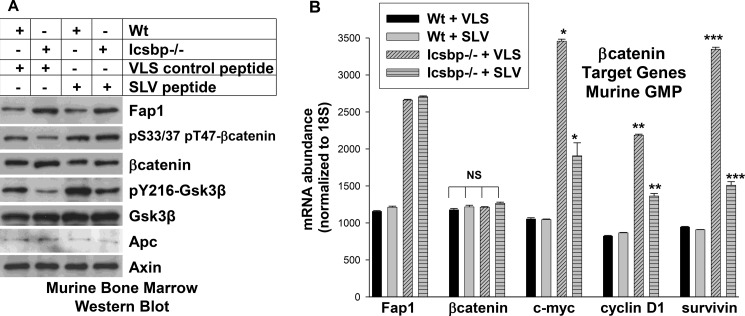FIGURE 2.
Fap1 influences tyrosine phosphorylation of Gsk3β, βcatenin protein expression, and serine/threonine phosphorylation of βcatenin in an Icsbp-dependent manner. A, treatment of primary Icsbp−/− murine myeloid progenitor cells with Fap1-blocking peptide increases tyrosine phosphorylation of Gsk3β, decreases βcatenin protein, and increases βcatenin serine/threonine phosphorylation. Bone marrow mononuclear cells from WT or Icsbp−/− mice were cultured in IL3, GM-CSF, and Scf, and CD34+ cells were separated (considered GMP conditions). Cells were treated with Fap1-blocking SLV peptide or control VLS peptide, and lysates were analyzed by Western blot analysis. Blots were serially probed with antibodies to Fap1, total and serine/threonine phosphorylated βcatenin, total and Tyr-216 phosphorylated Gsk3β, Apc, and Axin (as a loading control). B, treatment of primary Icsbp−/− murine myeloid progenitor cells with SLV peptide decreases βcatenin target gene expression. The cells described above were also analyzed for expression of mRNA representing Fap1, βcatenin, and βcatenin target genes (c-myc, cyclinD1, survivin) by real-time PCR. Statistically significant differences in mRNA abundance with SLV versus VLS peptide are indicated by *, **, or ***. NS, not significant. *, **, and *** represent statistically significant differences.

